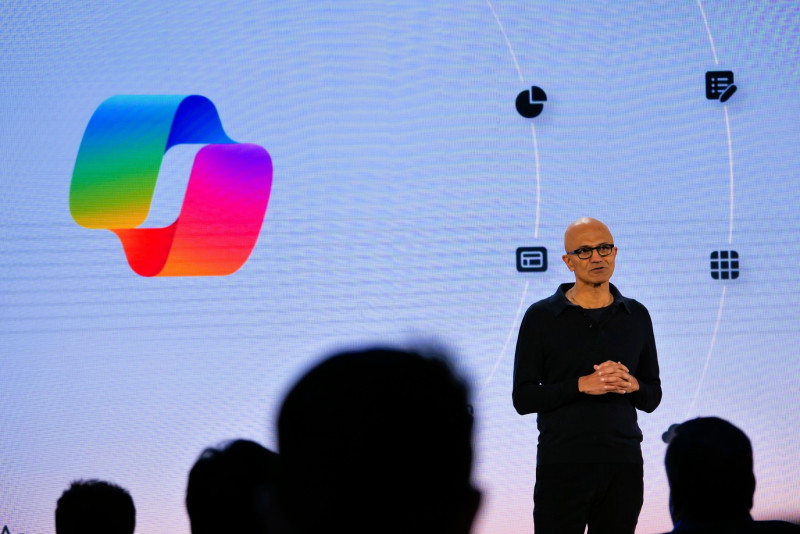Microsoft’s financial disclosures show how OpenAI is fueling growth — and taking a toll on profits
Microsoft disclosed the size of its OpenAI investment for the first time, acknowledging in its quarterly regulatory filing Wednesday afternoon that it has made “total funding commitments of $13 billion” to the ChatGPT maker.
That footnote in the company’s financial statements confirmed widespread reports about the magnitude of its investment. Because it came in a filing for the quarter ended Sept. 30, it doesn’t include the additional $750 million that Microsoft reportedly invested in OpenAI’s latest funding round at the beginning of October.
But the juicier tidbit came in another footnote: Microsoft acknowledged that losses from its stake in OpenAI were part of the reason that it recorded a $683 million expense related to its equity investments in the quarter.
And on the company’s earnings conference call with analysts, Amy Hood, Microsoft’s chief financial officer, made it clear that this expense will be increasing significantly in the next quarter, due largely to OpenAI.
“Other income and expense is expected to be roughly negative $1.5 billion, primarily driven by our share of the expected loss from OpenAI, which is accounted for under the equity method,” Hood explained, referencing a type of accounting used to record one company’s share of another company’s profits or losses.
It’s important to note that OpenAI doesn’t represent the entirety of that line item in Microsoft’s financial statements. However, it’s clear that OpenAI is a big part of it, and its losses are starting to weigh meaningfully on Microsoft’s bottom line — to the point where it made sense for the company to start disclosing the numbers to investors.
To put the numbers in context, Microsoft reported profits of about $25 billion in its latest quarter.
At the same time, Hood sought to make clear that Microsoft’s overall AI investment is paying off, noting that the company’s AI business is on pace to exceed a $10 billion annual revenue run rate in the second quarter.
“This will be the fastest business in our history to reach this milestone,” Hood said on the conference call. “We are committed to growing this leadership position across our entire Microsoft Cloud while maintaining our disciplined focus on cost management and prioritization across every team.”
Responding to an inquiry from GeekWire, a Microsoft spokesperson confirmed that the company was previously including the impact of the OpenAI investment in the “other income and expense” line item, and decided to start disclosing it explicitly to help investors understand the impact.
The spokesperson noted that the new disclosures do not indicate any change in the company’s OpenAI partnership or relationship.
Overall, OpenAI expects to lose about $5 billion this year, the New York Times reported Sept. 27, citing financial documents reviewed by the newspaper in conjunction with the startup’s latest funding round.

The new disclosures by Microsoft about OpenAI follow reports of tensions between the companies, and signs that Microsoft is hedging its bets — partnering, for example, with Anthropic and Google to provide alternatives to ChatGPT for developers using Microsoft’s popular GitHub Copilot coding companion.
The growing size of the financial hit from the OpenAI investment helps to explain why Microsoft CEO Satya Nadella took the time to put the OpenAI relationship in perspective on the earnings call on Wednesday.
“Our partnership with OpenAI also continues to deliver results,” Nadella said in his prepared remarks. “We have an economic interest in a company that has grown significantly in value.”
He said usage of Microsoft’s Azure OpenAI service has doubled in the last six months. Microsoft said in its earnings report that AI services contributed 12 percentage points to a 33% increase in Azure cloud revenue in the quarter.
Later in the call, Nadella went into greater detail in response to an analyst’s question.
“The partnership for both sides — that’s OpenAI and Microsoft — has been super beneficial,” he said, adding that Microsoft “effectively sponsored” what became one of the “highest-valued private companies today when we invested in them, and really took a bet on them and their innovation, four or five years ago.”
That, in turn, “has led to great success” for both companies, which Microsoft and OpenAI continue to build upon, Nadella said. He cited Microsoft providing OpenAI with the infrastructure needed for their innovations, and Microsoft’s ability to leverage the resulting AI models from OpenAI, in addition to those that it trains and runs itself.
“We feel very, very good about our investment stake in OpenAI, and our own our focus,” he said. “We’re always in constant dialogue with them. In a partnership like this, when both sides have achieved mutual success at the pace at which we’ve achieved it, that means we need to push each other to do more to capture the moment, and that’s what we plan to do — and we intend to keep building on it.”

